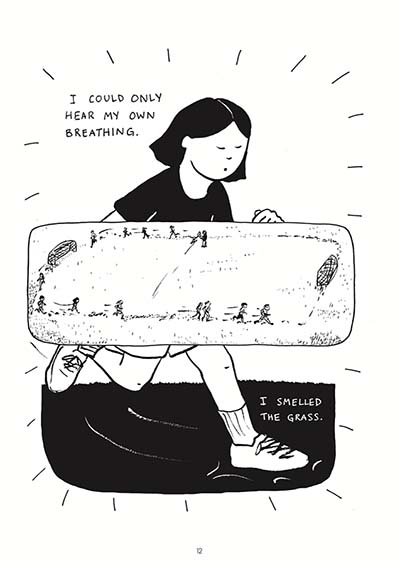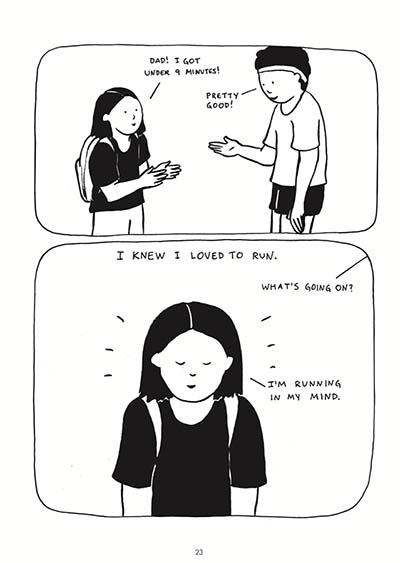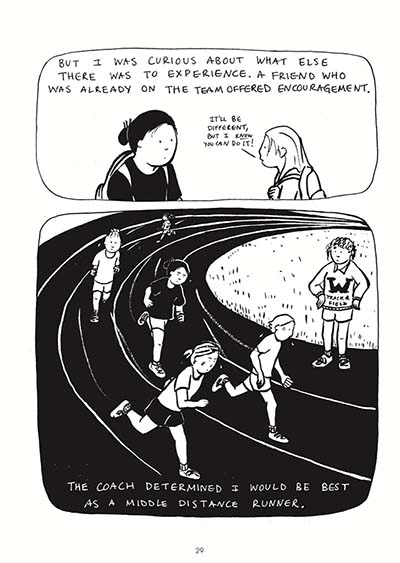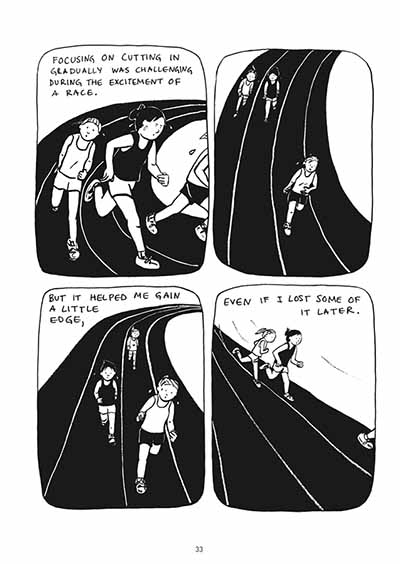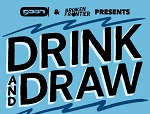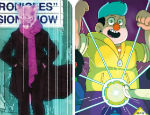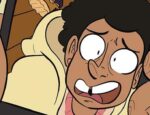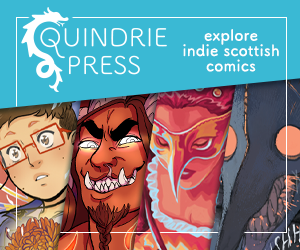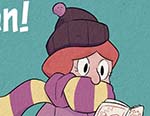Given that Mylo Choy’s graphic memoir Middle Distance started as an idea for a thirty-page comic, and quickly grew into a full-blown graphic novel produced by SelfMadeHero, this is no mean feat. Even more impressive was finding out that Middle Distance is Choy’s first graphic novel – with seamless storytelling, smooth illustrations and a meditative message that will leave you thinking, this graphic debut from Choy is a little triumph.
Grappling with themes of identity, emotions and growth, Middle Distance is a must-read for anyone who has ever found vocalising emotions hard or struggled with their sense of self (I think that pretty much covers all of us!).
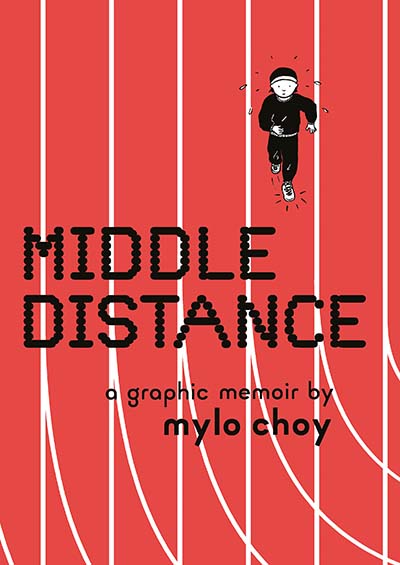
At the beginning of Middle Distance, we meet Mylo Choy’s graphic novel counterpart. As a child, Choy remembers falling in love with different activities: first drawing, in which they could create their own world. Then reading, where they could have a thousand adventures from the confines of their mind. Then comes running—a mile race in school. And although the practice makes Choy tired, it also makes them focus. Initially embarrassed by being seen running in public, Choy begins to feel real peace and a sense of self from their new hobby, so much so that, as they continue to grow older, the running becomes more than just a hobby; it is an activity that brings them a deep sense of joy and something they rely on. This only continues as they join a track team at college, in which they are gently encouraged by a clever play on words: ‘Pain is just French bread’.
The way that Choy represents running as a way of feeling focused and at peace will resonate with readers. You can almost feel Choy’s innate focus on breathing steadily and pushing themselves to reach the finish line, just through subtle shifts in the backgrounds and close-ups on the character’s faces. For those who aren’t runners, and who would roll their eyes at feeling like running provides any sort of benefits emotionally, READ THIS! It will change your mind, even if running seems like the last thing you’d ever want to do. Refreshingly, Choy isn’t depicted as the fastest runner, or the one who always reaches the finish line first.
Choy themself is the quickest to note that they were often the slowest on their respective track teams. But it’s not the satisfaction of ‘winning’ that inspires them to keep running. It’s the freedom, the release of endorphins, the experience of being at one with your body. As Choy says: “I was in a cocoon of my own experience. I felt free. A new way to be in my own world”. The exceptional use of lines to emphasise movement and emotions works brilliantly and makes the readers’ hearts beat faster when Choy pushes themselves. For eyes which are mere dots on a page, Choy manages to let readers know exactly what the characters are thinking, even without words, through shades and emphasis.
However, Middle Distance isn’t all fun and games – as the title would imply, it’s about Choy finding their middle distance – finding the right balance in their life between the physical and the emotional. This comes to a head when, years later, Choy develops a problem with their knee, and is unable to run for an extended period. Through this, they find that, while running has primarily been a positive outlet in their life, it also may have been a way of avoiding certain doubts and worries. This is a bleak time for Choy and is represented in the darker-style comic strips on these pages. Running is the thing that they have completely put their faith in, and they are now unable to do it without hurting themselves further. Choy experiences a deep feeling of loss, as the reader watches them struggle to stay afloat in black, murky water. The more they struggle, the more the fear pulls them under, in wonderfully evocative panels.
This is where the ‘middle distance’ solution comes in. Choy remembers a tale from their childhood about Buddha, in which neither luxury nor self-denial satisfy the god. There must be a ‘middle distance’. And now Choy has a chance to discover that for themself. Without running as an outlet, Choy finds themself dealing with their negative emotions more – sitting with them, and sorting through them in their head. This helps them work out a lot about themselves, including life changes to do with gender and identity. Through this, Choy realises that, while speeding up can be a fantastic way to feel at peace, slowing down and processing your emotions is important. The previously black, murky water becomes more visible, as Choy metaphorically learns to swim. The monsters lurking beneath, like fear and worry? Choy learns to acknowledge them without being terrified of them: “A way to be in the water without drowning. A place in the middle2.
Middle Distance is a thoughtful graphic novel that will, through Choy’s brave and honest narrative, gently encourage introspection, and maybe even inspire readers to take up running themselves! A fantastic debut from Mylo Choy.
Mylo Choy (W/A) • SelfMadeHero, £14.99
Review by Lydia Turner





